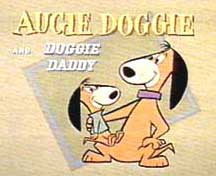| Augie Doggie and Doggie Daddy | |
|---|---|
 | |
| Genre | Comedy Slice of Life |
| Created by | |
| Written by | Michael Maltese |
| Directed by |
|
| Voices of | |
| Theme music composer |
|
| Composers | |
| Country of origin | United States |
| Original language | English |
| No. of seasons | 3 |
| No. of episodes | 45 |
| Production | |
| Producers |
|
| Production company | Hanna-Barbera Productions |
| Original release | |
| Network | First-run syndication |
| Release | September 19, 1959 – October 20, 1961 |
Augie Doggie and Doggie Daddy are two Hanna-Barbera cartoon characters who debuted on The Quick Draw McGraw Show and appeared in their own segment. The segments centered on the misadventures of a dachshund father-and-son team. [1] Doggie Daddy (voiced by Doug Young with a Brooklyn accent, based on a Jimmy Durante impersonation) tried to do the best he could at raising his rambunctious son Augie (voiced by Daws Butler). [2] The characters have made appearances outside of their series, including in their own video game and in Yogi's Ark Lark and its spin-off series.